Shaping Moral and Political Character is a University's Essential Role, Prof. Michael Sandel Says as National Symposium Begins
April 7, 2003
View Symposium Schedule; Visit Symposium Web Site
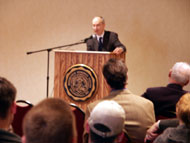 April 7, 2003, Greencastle, Ind. - "What does a university education have to do with politics?," Michael J. Sandel asked as he began his keynote address to the national symposium, “Political Education and the Modern University", as it opened at DePauw University this morning. "Universities exist for at least two obvious reasons -- to pursue and transmit the truth, and to prepare students to get good jobs and have successful careers," continued Sandel, the Anne T. and Robert M. Bass Professor of Government at Harvard University, where he has taught political philosophy since 1980. "So, what reason is there to think that universities should take on the project of shaping moral and political character?... Shouldn't a university education free students to choose their own values, their own conceptions of the good life, for themselves? Well, yes and no," Sandel said.
April 7, 2003, Greencastle, Ind. - "What does a university education have to do with politics?," Michael J. Sandel asked as he began his keynote address to the national symposium, “Political Education and the Modern University", as it opened at DePauw University this morning. "Universities exist for at least two obvious reasons -- to pursue and transmit the truth, and to prepare students to get good jobs and have successful careers," continued Sandel, the Anne T. and Robert M. Bass Professor of Government at Harvard University, where he has taught political philosophy since 1980. "So, what reason is there to think that universities should take on the project of shaping moral and political character?... Shouldn't a university education free students to choose their own values, their own conceptions of the good life, for themselves? Well, yes and no," Sandel said.
Known for books including Democracy's Discontent: America in Search of a Public Philosophy, Sandel told the audience at the Student Social Center of the Walden Inn, ![]() [DOWNLOAD VIDEO: "Yes and No" 631KB]
[DOWNLOAD VIDEO: "Yes and No" 631KB] ![]() [DOWNLOAD AUDIO: "Yes and No" 155KB] "A University education should be an education that equips men and women for freedom; to be free citizens. But, no, this doesn't just mean the freedom to
[DOWNLOAD AUDIO: "Yes and No" 155KB] "A University education should be an education that equips men and women for freedom; to be free citizens. But, no, this doesn't just mean the freedom to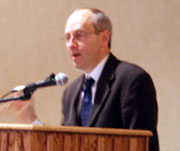 pursue my own wants and desires unimpeded."
pursue my own wants and desires unimpeded."
What is freedom? Sandel argued that there is a market conception of freedom which suggests to be free is "to pursue my own interests and ends without interference... {and] imagines the setting of freedom to be something like a shopping mall where, the more range of choice, the more consumer goods available to me and the greater my access to them given my income and wealth, the greater my freedom." Under the other, the civic conception of freedom, "to be free isn't just to be able to pursue my wants and desires unimpeded, it's to share in self-rule, it's to have a meaningful say in shaping the destiny of the political community as a whole. To be a free citizen, on this second tradition, is to participate in self-government," the professor stated.
Character formation is a key component in the creation of free citizens under the civic conception, Sandel says, because ![]() [DOWNLOAD AUDIO: "Character and Freedom" 222KB] "in order to participate meaningfully in self-government requires more than the ability just to identify my own interests. It also requires the capacity to deliberate well about the common good. And this requires certain capacities -- first of all, a certain knowledge of public affairs.
[DOWNLOAD AUDIO: "Character and Freedom" 222KB] "in order to participate meaningfully in self-government requires more than the ability just to identify my own interests. It also requires the capacity to deliberate well about the common good. And this requires certain capacities -- first of all, a certain knowledge of public affairs. 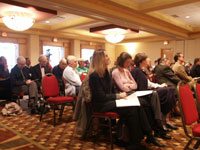 But it also requires something else, it requires an orientation toward common purposes and ends rather than simply to my own individual interests."
But it also requires something else, it requires an orientation toward common purposes and ends rather than simply to my own individual interests."
The civic conception of freedom, Sandel continued, "requires a formative project so that citizens will come to acquire certain habits and dispositions, certain qualities of character, what some in the tradition call 'civic virtues.'" The problem, says the nationally-known thinker, is that most students come to college in the modern age to improve their job prospects, and he says, many universities pander to that. He notes that the civic mission of a university "is always at tension with the vocational, pre-professional aims. ![]() [DOWNLOAD AUDIO: "At Tension" 151KB] Insofar as universities aim at equipping and preparing students to get good jobs [and] to have successful careers, what they're doing is, when they succeed, universities are fitting students to the world. They're fitting students to social and economic roles and vocations that confer certain rewards."
[DOWNLOAD AUDIO: "At Tension" 151KB] Insofar as universities aim at equipping and preparing students to get good jobs [and] to have successful careers, what they're doing is, when they succeed, universities are fitting students to the world. They're fitting students to social and economic roles and vocations that confer certain rewards."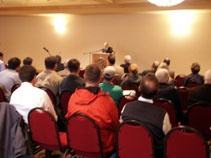
In fact, Sandel insists that universities should ![]() [DOWNLOAD AUDIO: "Misfits" 291KB] "not fit students to society too well or too completely. In fact, a good university education, from the standpoint of its civic mission, produces not a perfect fit between students and the world -- it produces misfits... students who don't take their society's established roles and practices as given, but instead take those roles and practices as open to criticism, contest, argument, dispute and revision."
[DOWNLOAD AUDIO: "Misfits" 291KB] "not fit students to society too well or too completely. In fact, a good university education, from the standpoint of its civic mission, produces not a perfect fit between students and the world -- it produces misfits... students who don't take their society's established roles and practices as given, but instead take those roles and practices as open to criticism, contest, argument, dispute and revision."
Professor Sandel cited a number of examples of what he calls the "marketization of higher education" -- among them, the University of Virginia selling on-campus burial plots to alumni and Harvard marketing a line of clothing bearing the University's logo in Japan -- and suggested that many schools are spending more time wooing prospective students and alumni dollars than ever before while straying from the teachings of the great thinkers and religious traditions that 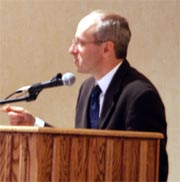 underscore a university's civic mission. He also pointed to the rise of corporate universities, such as McDonald's Corporation's Hamburger University in Oak Brook, Illinois. Sandel says there were 15 corporate universities in the 1980s and are some 2,000 today. Students at Hamburger U. aren't likely to read Plato, let alone know who he is, as the institution and others like it are designed to train future managers, not critical reflection.
underscore a university's civic mission. He also pointed to the rise of corporate universities, such as McDonald's Corporation's Hamburger University in Oak Brook, Illinois. Sandel says there were 15 corporate universities in the 1980s and are some 2,000 today. Students at Hamburger U. aren't likely to read Plato, let alone know who he is, as the institution and others like it are designed to train future managers, not critical reflection.
In closing, Sandel said, ![]() [DOWNLOAD AUDIO: "The Challenge" 454KB] "The challenge for public education, for political education, for character formation in the university today is made all the more difficult by the fact that American public life is awash in the market conception of freedom, crowding out the more demanding civic conception of freedom."
[DOWNLOAD AUDIO: "The Challenge" 454KB] "The challenge for public education, for political education, for character formation in the university today is made all the more difficult by the fact that American public life is awash in the market conception of freedom, crowding out the more demanding civic conception of freedom."
Dr. Sandel thanked DePauw University President Robert G. Bottoms, who provided the symposium's opening welcome, for being "a leading voice for the civic mission of higher education and for the citizenship mission of universities," 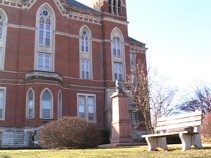 and congratulated symposium organizer and professor of political science Dr. Robert Calvert, "who's not just done heroic work in convening this remarkable symposium, but also has done so much to frame such fundamental questions."
and congratulated symposium organizer and professor of political science Dr. Robert Calvert, "who's not just done heroic work in convening this remarkable symposium, but also has done so much to frame such fundamental questions."
The symposium, “Political Education and the Modern University", which is supported by a grant from the Mellon Foundation, continues through Saturday. For a complete schedule of events, click here.
